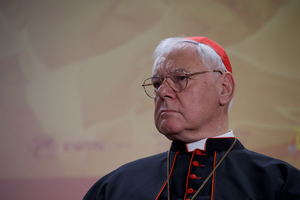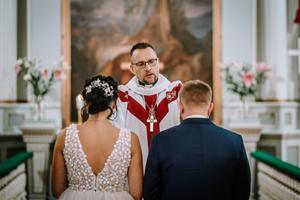Francis’ Fifth: A Synod, Humanae Vitae Milestone and More Decentralized Church
The 81-year-old Pope will mark the fifth year of his pontificate March 13.

A synod of bishops on youth, further moves toward a decentralization of authority from the Vatican, and a probable consistory of new cardinals are just some of the expected papal happenings to take place in 2018.
Events already locked in the calendar make clear that another busy year awaits Pope Francis, one in which he is expected to press on in pursuing his vision for the Church as he approaches the fifth anniversary of his pontificate.
One of the most significant papal engagements will be the 15th Ordinary General Assembly of the Synod of Bishops, on the theme “The Young, Faith and Vocational Discernment,” to be held in October.
Francis, who just turned 81, has said the theme is “consistent” with the content of Amoris Laetitia (The Joy of Love), his summary document on the 2014 and 2015 Synods on the Family, and it will aim “to accompany the young on their existential journey to maturity” so that through “discernment” they will “discover their plan for life and realize it with joy.”
The synod itself promises to introduce a “new approach” for the Church concerning youth, moving away from the tendency to think “we have always done it this way,” in the words of Pope Francis. It is expected to focus on helping them deal with today’s challenges such as the “throwaway culture” of a consumerist society.
The synod will be preceded by a March 19-24 meeting of young people in Rome held by the Synod Secretariat to allow them to share “their hopes, doubts and worries ahead of the synod.”
The Vatican last year sent out a 25-page preparatory document to all the dioceses in the world, which included a questionnaire to allow young people to share their opinions on social issues ahead of the October synod.
The Register has learned the Vatican has been overwhelmed with tens of thousands of responses, and as well as posing a processing challenge for the synod secretariat, critics have said the preparatory document “is heavy on sociology and psychology and light on Scripture and Tradition.” Others are concerned the synod will be pushed in a harmful direction, largely because it will fail to address the most serious problems facing young people today. But still others see the synod as a very positive way for the Church to accompany young people in their human and spiritual growth so that they can make the world a better place.
A further possible flashpoint for heated debate this year will be the 50th anniversary of Pope Blessed Paul VI’s encyclical Humanae Vitae (The Regulation of Birth), which reaffirmed the Church’s ban on artificial contraception. There are concerns that moves are underway to use this anniversary to reassess the encyclical and implement a “new moral paradigm,” as some have tried to do in their interpretation of Amoris Laetitia.
The intention of such moves would be to soften the Church’s position upheld in Humanae Vitae — an encyclical believed by its proponents to have been prophetic, as it foresaw that widespread use of contraception would lead to a breakdown of the family and a greater dehumanization of society.
The Church officials involved in the commission, established in 2017 with Pope Francis’ approval to study Humanae Vitae, say that concerns about weakening the document are unfounded.
Papal Trips
So far, only one overseas papal visit has been confirmed for this year: to Peru and Chile, Jan. 15-22. The apostolic voyage will be significant for its emphasis on the environment and the welfare of indigenous people. The Holy Father will meet indigenous communities from the Amazon in Lima Jan. 19 — a timely visit ahead of the 2019 Pan-Amazonian Synod of Bishops.
This will be his fifth trip to the Americas, which he reportedly views as one continent, and like the 21 other visits outside Italy that he has made since his election, the people he will meet are typical of the “peripheries” that are a central focus of this pontificate.
The Holy Father is expected to visit Ireland in the summer, at some point during the World Meeting of Families in Dublin that takes place Aug. 21-26.
Since the implosion of the faith in Ireland due to the clerical sex-abuse crisis and rampant secularism, the Pope will effectively be traveling to a country that once led the world in missionary outreach but is now on the Church’s periphery.
His visit is also likely soon after a referendum on whether to repeal Ireland’s ban on abortion in almost all circumstances. The vote is expected to take place sometime in the summer.
Many will be interested to see if Francis also becomes the first pontiff to visit Northern Ireland, once the focal point of the “Troubles” between Unionists wanting to remain part of the United Kingdom and Republicans aiming for a united Ireland. Pope St. John Paul II came close to making it there during his visit in 1979, but security prevented him from crossing the border.
Other possible visits this year could be to Romania and India, postponed from 2017. The Pope told reporters on the flight back from Bangladesh in December that he needed a “single trip” to India, given it is a vast and culturally diverse country, and he hoped “to do it in 2018 if I’m alive!”
Also possible is a trip to Estonia, Latvia and Lithuania, to mark 100 years since their independence. The visit, which the Vatican says is still in its planning stage, would be timely, as concerns grow about Russian aggression against the Baltic states.
Within Italy, the Pope is to make a pastoral visit to Pietrelcina and San Giovanni Rotondo March 17. The trip will mark the 50th anniversary of the death of St. Pio of Pietrelcina and the 100th anniversary of Padre Pio receiving the stigmata. The Holy Father will visit a pediatric oncology ward of the hospital St. Pio founded.
Papal Appointments
Papal appointments will be something to look out for this year, with expected changes in leadership within the Roman Curia as well as dioceses worldwide. Included among those could be Cardinal Donald Wuerl, the archbishop of Washington D.C., who is two years beyond retirement age, although insiders say the Pope is likely to keep him on for at least another year.
Others who will have just reached or will reach the retirement age of 75 this year and could be replaced include Cardinal Leonardo Sandri, the Argentinian prefect of the Congregation for Oriental Churches; Cardinal Giuseppe Versaldi, prefect of the Congregation for Catholic Education; Bishop Marcelo Sanchez Sorondo, chancellor of the Pontifical Academy of Sciences; and Cardinal Jean-Louis Tauran, president of the Pontifical Council for Interreligious Dialogue. The French cardinal has worsening symptoms of Parkinson’s disease, which has affected him for some years and prevented him from joining the Pope on his recent visit to Burma and Bangladesh.
Senior Curial officials who are well past retirement age and expected to step down this year are Cardinal Angelo Amato, prefect of the Congregation for the Causes of Saints (he turns 80 in June), and Cardinal Francesco Coccopalmerio, president of the Pontifical Council for Legislative Texts, who will celebrate his 80th birthday in March.
Also due to reach retirement this year is Cardinal Domenico Calcagno, president of the Administration of the Patrimony of the Apostolic See — a Vatican dicastery at the center of questions concerning the Pope’s reform of Curial finances. The continuing tensions over financial reform, with obstructions of investigations into alleged corrupt practices, could remain a significant challenge for the Pope in the months ahead.
Meanwhile, eyes will be on the future of key papal adviser Cardinal Oscar Andrés Rodriguez Maradiaga of Honduras, following an investigation into corruption allegations in his archdiocese (see related story on page 10).
The cardinal, who turned 75 in December and handed his resignation to the Pope on age grounds, has denied many of the accusations, although questions remain unanswered. So far, he remains archbishop of Tegucigalpa, a position he has held since 1993.
As of Jan. 1, the number of cardinal-electors under the age of 80 is precisely 120 — the suggested limit set by Blessed Paul VI. But by mid-June, that number will have fallen to 114, giving Pope Francis the possibility of holding a small consistory in the fall to create six new red hats. That would take the number of his personal choices of cardinal-electors to 55, almost half the number eligible to vote in a conclave.
Persistent rumors have circulated that he wants to enlarge the number of cardinal-electors to more than 150, paving the way for a much larger consistory, but so far no concrete evidence has emerged that this will actually happen.
Decentralization Drive
Meanwhile, the push toward decentralizing the Church away from the Vatican and into the hands of local bishops is expected to continue, in line with the Pope’s vision laid out in his 2013 apostolic exhortation Evangelii Gaudium (The Joy of the Gospel).
Speaking about the most recent meeting of the “Council of Nine Cardinals” on Curial reform, Vatican spokesman Greg Burke said that the priority for the Pope is not reform of structures and changing documents so much as creating a “mentality of service” based on the vision that the Holy See “is at the service of the local Churches.”
Prominent examples of the Holy Father’s intention to extend greater authority to bishops’ conferences in matters that involve the Church’s doctrine and pastoral practice include Amoris Laetitia, which has controversially resulted in bishops having differing interpretations of pastoral practice with regard to allowing civilly remarried divorcees to Holy Communion, and his recent motu proprio on liturgical translations, Magnum Principium, which reduced Vatican oversight over translations into local languages.
Other areas where such an approach potentially could come under consideration in the upcoming months include ordaining some married men and intercommunion for Protestant spouses.
Concerns over these and other issues related to doctrine and the effects on the Church of decentralization are likely to be a continued challenge for the Pope in the months ahead.
In terms of the Holy Father’s pastoral outreach, he is expected to continue to witness to Divine Mercy by making further surprise visits to the poor, sick and elderly in Rome and further afield.
Meanwhile, on the global scene, look out for further diplomatic efforts toward Russia, China and the Islamic world, as well as interventions in trouble spots such as Venezuela, the Middle East and Africa — part of what L’Osservatore Romano’s director, Giovanni Maria Vian, has said is Francis’ skill in “breaking down walls between North and South.”
Edward Pentin is the Register’s Rome correspondent.


















